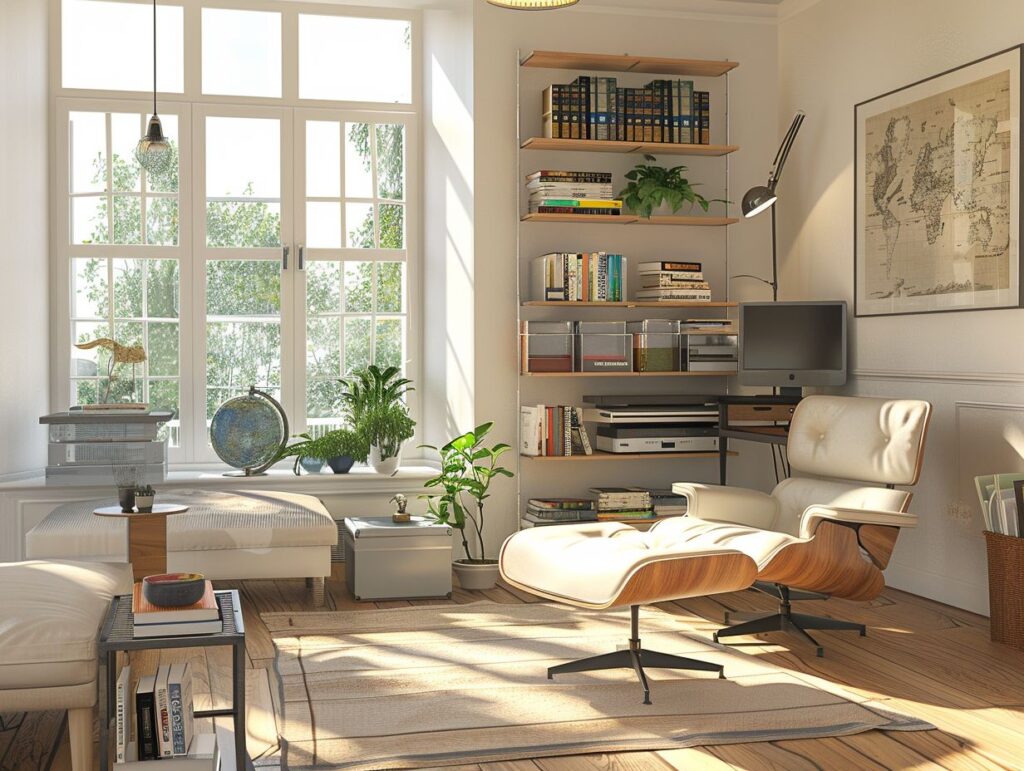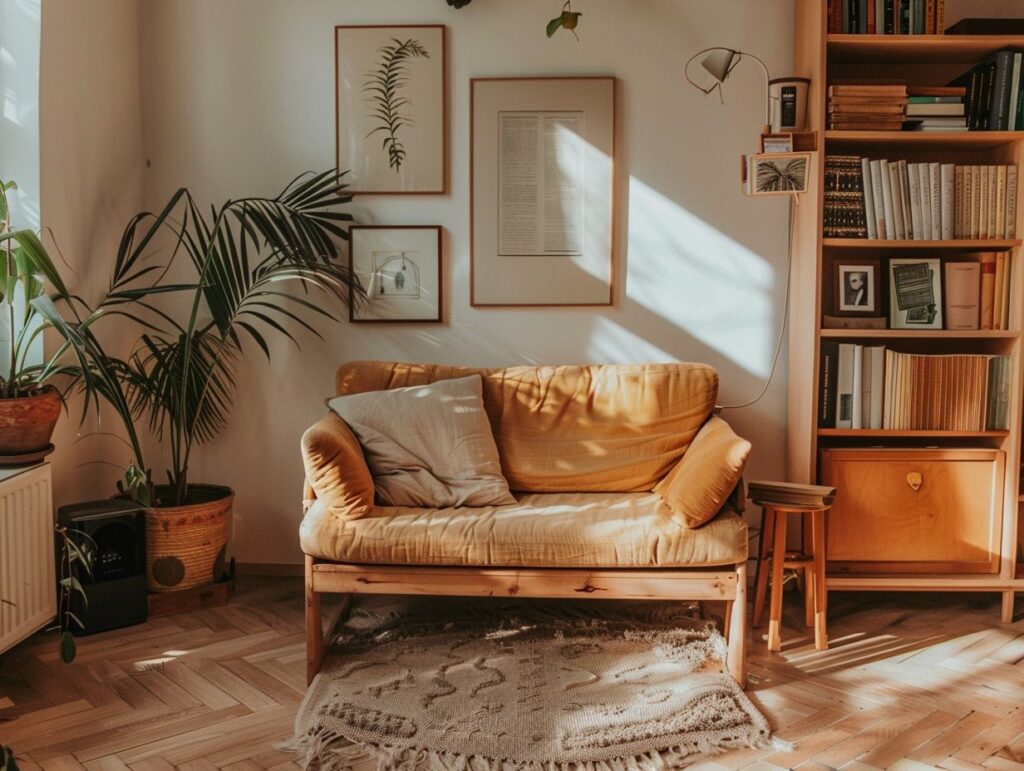In today’s fast-paced world, you might feel overwhelmed by daily life’s constant demands. Have you ever considered how your home’s state could add to your stress levels?
Let’s discuss the powerful connection between clutter and stress and how decluttering can positively impact mental health and productivity.
We’ve got step-by-step guides to help you maintain a clutter-free home and practical tips to create a clean and organised space that encourages relaxation and overall wellbeing.
If you’re ready to declutter and destress, keep reading to learn how a clean home can boost your overall wellbeing.

The Connection Between Clutter and Stress
The connection between clutter and stress is crystal clear. An untidy space can really mess with your mental health and overall wellbeing.
When you live in a cluttered mess, it’s no wonder you feel overwhelmed and anxious, right? It’s hard to kick back and concentrate in all that chaos. Studies show that a disorganised environment can crank your cortisol levels, that pesky stress hormone.
Keeping a neat and orderly home can bring on those chill vibes. Decluttering doesn’t just free up physical space – it also clears out your mind, giving you better mental clarity and dialling down the stress. So, by crafting a peaceful spot to call home, you’re setting the stage for a healthier mental state.
Understanding the Impact of a Messy Home
Living in a messy home can lead to a decline in your mental health. Cluttered spaces often contribute to heightened stress levels and reduced feelings of wellbeing.
This decline in mental wellbeing can manifest in various ways, such as increased feelings of anxiety and difficulty focusing on tasks. For instance, a cluttered workspace may make concentrating challenging, decrease productivity, and cause feelings of being overwhelmed. In addition, the constant visual reminder of disorganisation can create a continuous cycle of negative thoughts and emotions. By decluttering and maintaining an organised living space, you can create a more peaceful environment that supports your mental health and overall happiness.

Benefits of Decluttering for Your Wellbeing
Decluttering your living space can improve your wellbeing. It brings a sense of calm and order that can do wonders for your mental health.
When you clear out the excess stuff and tidy up your surroundings, you create a space that’s easy on the eyes and promotes harmony. This feeling of order can impact mental clarity and help lower stress levels.
A clutter-free environment lets your mind concentrate better, which can lead to increased productivity and a greater sense of peace. When your living area is clutter-free, you’ll likely notice a mood and overall wellbeing boost. It sets the stage for a more positive and serene state of mind.
Improved Mental Health and Productivity
Decluttering is not just a chore—it’s a game-changer for your mental health and productivity. When you tidy up your space, you’re setting yourself up for better focus, mental clarity, and overall efficiency.
Imagine this: you remove all that extra stuff and organise your space. Suddenly, you feel a wave of calm and order wash over you. It’s like a breath of fresh air for your mind. Research shows that a clutter-free environment can lower your stress and anxiety levels. And when you’re not surrounded by chaos, you can think more clearly and ace those decisions. A tidy space isn’t just about looks—it paves the way for smoother workflows, sparks creativity, and boosts your overall wellbeing.
How to Declutter Your Home
When you decide to declutter your home, you’re taking a big step towards boosting your mental and emotional wellbeing. You can included these steps to in your house chores checklist to create a peaceful and clutter-free living space.
- Start by looking at each room in your home, tackling one area at a time so you don’t get too overwhelmed.
- Go through your stuff methodically, making separate piles for things you want to keep, donate, or toss out.
- Storage solutions like bins, baskets, and shelves are used to keep things organised.
- Try the ‘one in, one out’ rule to stop clutter from building up again.
- And remember, less is more—focus on quality over quantity and only keep things that really add value or joy to your life.
Step-by-Step Guide to Tidying Up
Tidying up your living space can make a difference in how you feel. Try following simple steps to create a peaceful and clutter-free environment that boosts your wellbeing.
- One great tip for decluttering is to start small. Focus on one area, like a cupboard or a desk, before tackling larger spaces.
- Group your items into categories – keep, donate, or throw away – to make decisions easier.
- Storage solutions such as baskets, bins, and shelves can keep things organised and surfaces clear.
- Regularly dusting, vacuuming, and organising keep things clean and bring a sense of calm and order to your living space.
Just remember, tidying up is an ongoing process that brings lasting benefits.

Tips for Maintaining a Clutter-Free Home
Once you’ve achieved a clutter-free home, it’s time to maintain that organised space to keep things neat and peaceful. Here are some tips to help you out.
One effective strategy is assigning specific storage spots for different items, like organising toy bins or dedicating bookshelves. Implementing a daily cleaning routine, where you spend a few minutes tidying up daily, can stop clutter from piling up. It’s also vital to regularly declutter by donating or tossing out items that you no longer need to keep your living space serene. By making these habits a part of your daily routine, you’ll enjoy the benefits of a clutter-free and calm home environment.
Habits to Adopt for a Clean and Organised Space
To keep your space clean and organised, you need to develop specific habits. If you incorporate these practices into your daily routine, you’ll enjoy a clutter-free and peaceful home environment.
One important habit to start is establishing a daily cleaning routine. Spending a few minutes each day wiping down countertops, tidying up surfaces, and putting things back where they belong can make a big difference in maintaining a neat living area.
Another effective habit is to declutter regularly by going through your belongings and deciding what to keep, donate, or toss out. This not only helps keep your space organized but also prevents unnecessary accumulation of items.
Staying consistent with these habits is critical to achieving long-term cleanliness and peace of mind.
Other Ways to Destress and Improve Wellbeing
Along with decluttering, there are various practices you can incorporate into your routine to destress and enhance your overall wellbeing. Prioritise self-care and relaxation to lead a more balanced and serene lifestyle.
Engaging in mindfulness, for example, allows you to focus on the present moment, fostering a sense of calm and mental clarity.
Another beneficial practice is meditation, which can help reduce your stress levels and promote emotional wellbeing.
Creating a peaceful atmosphere at home by adding comforting elements like soft lighting, calming scents, and soothing sounds can also contribute to your relaxation.
Taking time for yourself, whether through hobbies, baths, or simply enjoying a quiet moment, is essential for rejuvenating your mind and body.
Incorporating Self-Care and Relaxation into Your Routine
Taking care of yourself and finding time to relax is crucial for your overall wellbeing. When you incorporate these practices into your daily routine, you can create a peaceful and calming environment that nurtures your emotional wellness.
Remember to make time for yourself and recharge your mental and emotional batteries. This will help you build resilience and tackle life’s challenges with a fresh perspective. Mindfulness techniques like deep breathing exercises and meditation can help you find inner peace and embrace positivity.
Remember, setting boundaries and learning to say no when necessary is important as part of your self-care routine. This is crucial for protecting your mental health and wellbeing. Surround yourself with positive vibes, whether through uplifting music, soothing scents, or simply taking nature walks.
These activities can further enhance your relaxation experience and improve your overall well-being.